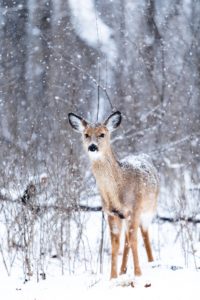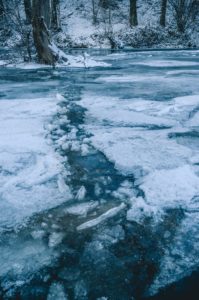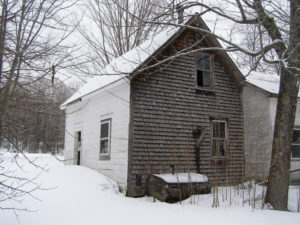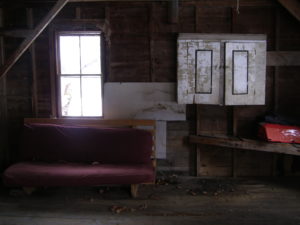Walking on our 26 acres, my path winds around open fields and keeps me out of heavy woods and brush, where ticks are waking. It’s grey and overcast, not raw but damp, a combination of snow and rain coming down and turning my already wild hair into a mad woman’s wig. The surface of the snow is glazed hard in most places, but when I get close to the tree line or streams that trickle down to the river, I punch through it and sink. Walking on the thick layer of leaves under and among the trees is like walking on a sopping sponge. My socks are sodden inside my winter boots.
I see thickets where the deer have slept, melting the snow with their warm bodies, lying out of the wind in the shelter of trunk and branch. I imagine them rising to their feet, squatting in their awkward way to leave pellets and a splash of urine, and then stepping away through the snow with those delicate hooves and legs. Their spoor is everywhere.
The medical transcription business is wildly unpredictable. One seesaws between frantic pleas from supervisors for overtime because of a sudden flood of work and the dreaded “no jobs available” message upon logging in. As I’m paid by production, no work means no money. Since the new year, work has been slow in the company and transcriptionists and supervisors alike are feeling the stress.
I’ve been thinking about my fear of not enough these days, and how small it makes me and my experience of life. One of the reasons I like to go out and walk is because it pushes against my tendency to curl up in corners and play hours of solitaire while I make up stories about living under bridges and berate myself for NOT PULLING MY WEIGHT and WASTING TIME.
The river is still ice covered, the edges yellowish and slushy. I see animal prints in the snow over the ice, but I wouldn’t dare try to walk on it. As I lean against a tree and look down at the ice-bound river, I hear a nesting pair of barred owls calling to each other, though it’s still early afternoon.
The truth is my medical transcription job is nothing more than a means to an end. It’s all about the paycheck. I take some modest pride in my ability to do an accurate, fast job, but I’m just a pair of skilled hands and ears. One day, when the job and I are finished with one another, I’ll leave no remnants of myself, no track, no scent, no spoor. It irritates me that it has so much power in my life when it means so little.
Water drops tremble on bare twigs and tree branches. The pussy willows are beginning to bud. Cloudy light washes the willow buds and water drops the same silvery grey and I have to draw near to tell the difference.
We’ve lately found a local lawyer to help us update our wills and take care of end-of-life paperwork. It’s made me think about all the fragments I’ll leave behind me, the furniture I’ve loved and polished; the mirror I’ve looked in since I was a child; the books I’ve handled and read in cars, in bathtubs, at tables, in beds and chairs and waiting rooms. All these things will be sifted through, separated, sold, passed on. What money there is will be divided and wind up in other bank accounts or hidey holes or cast back into the flow somehow. Perhaps whispers of me will cling to a few objects, but for the most part no one will ever know I passed this way.
We have an old shed on the land and snow slide off the roof has blocked the door and partially pushed it open. I’m just able to squeeze in over a thick layer of ice on the threshold, formed by melting snow dripping off the roof.
We cleaned out and swept the shed last fall, but I find pages of paper blown all over the floor, pages of the first draft of my book manuscript. Last summer we had visitors who used the shed, and I’d hoped they would read and give me some feedback. They didn’t, and I’d never found the manuscript when I looked for it after they left, but the winter currents and drafts discovered its hiding place. Perhaps the wind read it as it ruffled through the pages with chill fingers.
It’s odd to see those scattered pages on the cold, splintered floor. The sight of them gives me a desolate clarity. Those written words are the most important thing I have. Working or not working, large paycheck or vanishingly small paycheck, all the objects I love and use and call mine — none of that is really who I am. None of it really matters, though it takes up space in my life. None of it contains the smell of my breath, the taste of my pain or the spoor of my love the way my words do. It’s as though it’s me lying there, discarded, damp and wind strewn, unseen, unread, unwanted. It hurts me.
As I gather up pages, I note where the snow has drifted through gaps in corners. Wrinkled beech leaves lie on a discarded futon, whirled in through the broken window above it. I open a ramshackle cupboard and find a roll of shredded toilet paper and evidence of mice at work, making the most of an unexpected bonanza of nesting material.
I find a bottle cap and cigarette butts on a window sill. More leavings. I know who stood there, smoking, looking out the window. I stood where he’d stood and picked up the butts, knowing his lips were around them, his long-fingered hand had carried them from pack to mouth and then stubbed them out in the bottle cap, a tiny ashtray. I wish for the nose of a wild creature so I could search for the cold, lonely ghost of his scent.
He was here. I am here. Deer crisscross this land we call ours. Mice go about the business of ensuring more mice, and the barred owls carry on their early spring conversation about mating, nesting, eggs and all those mice. We are so caught up in jobs and money and things. We give them so much meaning. The days go by and we alternately struggle and dance through them. But one day we’ll be gone, and we’ll all leave spoor behind, a scent or sign or footprint uniquely and simply ours.
These words are my footprints, my scent, my lingering warmth in the places I came to rest, my spoor. They are signs of my passage and the truest things I have to leave behind when I’m gone.
All content on this site ©2017
Jennifer Rose
except where otherwise noted
© 2017 – 2021, Jenny Rose. All rights reserved.




Another piece from my heart…..amazing, thank you for sharing and for your spoors ????…
Thanks, Eldaa. Jenny
Very moved by this. Thanks for leaving traces of yourself where they can be found.
Thanks, Jen. Jenny
I am with you on your meandering of land…very strong stuff, Jenny.
Every day is a bonus! Imagine the tremendous fortune of living so long so as to actually have the opportunity to comprehend what went before and increase our understanding of our realities…very good stuff…
Writings..if anyone every plows through my stuff, it would be daunting, surely. But I write to be my own witness and that is enough. When I feel ‘complete’, do I ever go back and re-read? Well, it rarely happens…for the trick was done…As Mary Poppins said ‘Enough is as good as a feast.’
Meanwhile, the mice take just enough toilet tissue for their nests. The tiny ashtray holds one small butt by the magnificent wrong-headed departed youth before departing from that windowsill. The ticks await. The owls belong as we belong, even so.
Money…ACH and UGH! And I think transcription is a brutal job. Good you can get something out of it to pay the bills here in the sublime north of a warming planet. A triumph! I celebrate yo in my heart this day
…
26 acres! What a blessing!
Thanks, Sidney. Yes, nature is healing and we in Maine have a particularly beautiful place to live in. Jenny